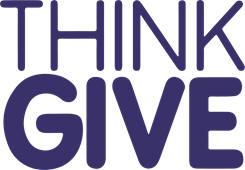
ThinkGive, Concord MA, provides schools and youth organizations with a research- based and standards-aligned social and emotional learning (SEL) program that
explores questions around identity, inclusion, social courage, and empathy, and
challenges students to act in ways that impact both themselves and others.
ThinkGive’s mission is to inspire young people to use kindness and empathy to engage with their world. The social and emotional learning (SEL) program focuses on the development of self-awareness, social awareness, and relationship skills that empower youth in grades 4-8 to reflect on who they are, who they want to be, and what kind of world they want to create. They consider other perspectives, build meaningful connections with a wide range of people, and cultivate the belief that they can positively impact their own lives and the lives of others. Our programs are delivered primarily by educators in schools and youth organizations using a Train-the-Trainer model.
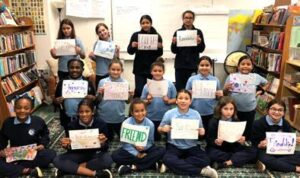
Vision
We believe that the best learning happens when youth are given agency and encouraged to take action. When they have a safe environment in which they can act and see the effect of their actions, they learn and grow. They feel more connected, self-confident, and empowered in the awareness of their own capacity to effect change—emotions that are paramount to ensuring emotional well-being.
Youth mental health has deteriorated nationwide over the past decade for complex reasons, including social media’s proliferation, slow progress on issues like racial injustice, and the lack of access to mental health providers. Millions of students are negatively affected by a lack of basic kindness, with 20% reporting having experienced bullying (US Dept of Education, 2019). In 2020–2021 the deteriorating mental health rates, coupled with the pandemic’s social isolation, created the perfect storm. Pre-COVID, anxiety affected 30% of youth; US Surgeon General Dr. Vivek Murthy warned that “anxiety and depression doubled during the pandemic” (New York Times, Dec 2021).
To improve students’ emotional well-being, it is imperative to develop a proactive strategy for teaching children how to live happy, meaningful, and productive lives. One of the most effective ways is to prioritize well-being and SEL within schools and youth organizations. At its core, SEL is the process of developing a healthy identity, cultivating empathy towards others, and making responsible, caring decisions (Weissberg et al., 2015). The focus must be on nurturing youth agency and positive peer connections, and on teaching prosocial skills like empathy. Data clearly shows that anxiety decreases and belonging increases when youth build healthy, positive connections with their peers, classroom, school, and an adult(s) at school. Research states that feeling valued, the foundations of which are respect, belonging, inclusion and fairness, is a fundamental pillar of human well-being (Isaac Prilleltensky, 2019). As such, cultivating a sense of belonging in classroom environments can help students effectively navigate emotional hardship.
Added to this, youth prosocial behavior—the propensity to act kindly or generously toward others—has been directly associated with positive emotional, social, and academic adjustment (Carlo & Ladd, 2000), and protects against risk for academic and emotional problems in low income neighborhoods (Flouri & Sarmadi, 2016).
History
Founded in 2013, ThinkGive has engaged 9,000+ youth in over 600 classrooms, with years of outcomes supporting our impact. ThinkGive began with pilot programs at two Massachusetts schools. Since then, we’ve grown at an annual rate of 24%. In 2021–2022, we engaged 2,500 youth at 47 schools/organizations largely throughout Greater Boston, 53% of which serve historically marginalized youth. Our program is delivered primarily by educators in schools and youth organizations using a Train-the-Trainer model. Teachers choose to use our program year after year, with 80% of schools and organizations returning.
Educators tell us that ThinkGive promotes interpersonal skills and empowerment. In fact, 89% of students report that they will “interact in a meaningful way more with people who are different from them (e.g., religions, beliefs, race, gender)” after participating in the program, and 85% feel “empowered that they can make a positive impact on their world.” As one educator said, “ThinkGive helps students see beyond themselves and realize they have the power to create a supportive community both within school and beyond.”
Activities
ThinkGive’s programs center around youth learning by taking action to positively impact their own lives and the lives of others. Students explore questions around identity, social courage, and inclusion, empathize with other perspectives, and build meaningful connections.
ThinkGive’s programs are based on the most commonly accepted theory of Positive Youth Development (PYD), the Six Cs Model. This framework outlines five psychological, behavioral, and social characteristics that indicate youth are thriving and that ultimately result in the sixth C, Contribution to self, community, and society:
-
- Social competency: In the ThinkGive program, youth are challenged to engage with peers and maintain healthy relationships.
- Connection: ThinkGive challenges youth to take action and connect with others. Youth report feeling more connected with their peers, teachers, family, and community.
- Character: Students explore their sense of self and moral scaffolding through discussion and self-directed action.
- Caring/compassion: This is a central theme and outcome of the ThinkGive program, both in the curriculum and in student self-directed actions.
- Confidence: Students experience firsthand the power of their words and actions and report a significant increase in self-esteem and empowerment.
- Contribution: Students discover that they can be agents of positive change and are inspired to make a real contribution in their schools and communities.

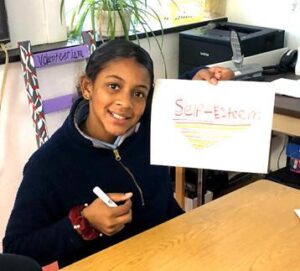
Program Models
ThinkGive offers a range of program models; educators choose what fits their interests and availability.
Our flagship programs, ThinkGive Elementary (grades 4-5) and ThinkGive Middle School (grades 6-8), explore themes of inclusion, identity, empathy, and equity. In each program, youth receive between 12–20 classroom curriculum hours and spend a wide-ranging amount of additional time taking individual action, reflecting on their actions, and collaborating with peers. Each program provides up to 16 grade-specific lessons. Most of our partner educators choose to teach one lesson per week.
We will release ThinkGive Junior for grades K-1 in October 2022.
We also offer shorter theme-based Spotlight programs that use our same experiential learning cycle and focus on Social Justice, Perspectives, and Allyship. Educators select a theme and teach the five lessons at their own pace. Between each lesson, students take action and use the ThinkGive web portal to reflect and collaborate. In October 2022 we will release a Gratitude Spotlight.
Curriculum
In the curriculum, kindness is a primary tool to enable students to become agents of change in their own lives, schools, and communities. ThinkGive utilizes a unique and innovative combination of in-class learning, student action, self-reflection, and peer-to-peer engagement.
Our program cycle has four components:
-
- THINK: Curriculum centers around a set of directives for giving.
- GIVE: Students take self-directed action impacting themselves and others.
- REFLECT: Students connect their actions with concepts discussed in class.
- SHARE: Students engage with and learn from peers on an online Team Page.
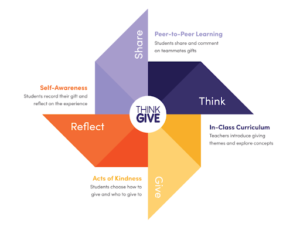
Students engage in this cycle multiple times over the course of their program, each time moving from giving to others in their comfort zone (e.g., self, family, friends) to others in their courage zone (e.g., community, peers they would like to get to know).
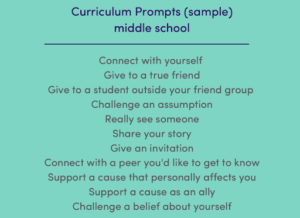
Our curriculum varies by grade, evolving in conjunction with students’ development. For example, the fourth-grade curriculum emphasizes how small, individual actions can have a powerful impact throughout the class community. By eighth grade, students challenge assumptions, recognize privilege and injustice, and spearhead efforts for positive change in their broader communities.
While our programs are designed to build from one grade level to the next, that is absolutely not required. For example, a school might choose to offer ThinkGive in just one or two grades. ThinkGive programs can be taught standalone, or they can complement and enhance broader SEL initiatives.
Student Portal
For the REFLECT and SHARE steps in the Program Cycle, ThinkGive leverages technology to enable student collaboration. Every participating student has their own password-protected personal page on the ThinkGive website. Students customize their personal pages with an image, and share a little about themselves with peers on their team. Then they visit their personal page throughout the program to record the actions they took, answering reflective questions that connect their action with the ideas and concepts discussed in the curriculum. When they are finished, they post their action to the Team Page. They can choose to share with their team, or keep the details private. If they choose to share, their peers are able to read what they wrote, “Love” an action, and/or add a comment. These social media features are optional; educators can turn them off and use the platform only for reflection and sharing.
This portal is a wonderfully visual way to show collective impact. It allows for students to learn from each others’ actions, encourages students to engage, and creates a space that celebrates positivity, inclusion, and empathy.
Importantly, for schools and organizations that either choose an offline experience or lack access, ThinkGive provides all reflection materials in worksheet format and coaches on ways to accomplish the student reflection and collaboration phases of the project cycle offline.
Professional Development
ThinkGive utilizes a Train-the-Trainer model. Program staff partner with educators to provide training and best practices to maximize the impact of our curriculum. Their roles include program preparation, curriculum sequencing, teacher training, support throughout (technical and programmatic), and follow-up around outcomes. This scaffolding is especially important in a partner’s first two years working with ThinkGive. Our experience shows that after this point, partner educators are able to effectively deliver the program with greatly reduced ThinkGive staff support.
Educator Forum
For active ThinkGive educators, we offer our ThinkGive Faculty Room, an online community that provides a space for educators to connect and collaborate with peers no matter the grade they teach or where they’re located. This forum provides content and conversation that can be adapted for the classroom, including articles, podcasts, and other resources centered around the themes of kindness, connection, empathy, and inclusion.
Junior Advisory Board
ThinkGive’s Junior Advisory Board (JAB) is a team of high school and college students from diverse backgrounds and fields of study who come together virtually to grow their leadership skills, bring youth perspectives to ThinkGive’s work, and take action to effect change in their communities. Accepted members join a virtual, nation-wide youth community and practice leadership and collaboration skills, design and implement their own project, and gain exposure to nonprofit and education work.
Interested students can visit our website to learn more about the commitment, member benefits, and apply. Importantly, applications are only open every year between September 1 – September 30. We announce each JAB cohort in early October.
Audiences served (Also see “Succesful Impact”)
Students:
ThinkGive has engaged over 9,000 youth in grades 4-8. Our program is delivered mainly in schools and youth organizations. In the 2022–2023 school year, ThinkGive will be integrated into 60 schools/organizations (~3,000 youth), 55% of which serve historically disadvantaged youth.
Of the total number of youth we reach, 60% are located in the Northeast United States. We also work with schools across the United States, and internationally with 13 schools/organizations in Ghana, South Africa, and Kenya.
Teachers:
Teachers are active participants before, during, and after program implementation. They choose to use our program year after year with 80% of schools and organizations returning.
Partnerships:
To accomplish our goal of bringing SEL to marginalized youth, we partner with schools and youth organizations that are serving these populations. Through our Every Child Scholarship, we can provide our program and support at no cost.
Partner schools/organizations in Massachusetts include include: Danny’s Place Youth Services (Acton), Boys & Girls Clubs (Assabet Valley, Framingham, Lynn, Condon, Marlborough, Woburn), Greater Lawrence Technical School (Lawrence), Douglas MacArthur Elementary (Waltham), Harlem Lacrosse Summer Program (Boston), LEAP for Education (Salem and Lynn), McCarthy Elementary School (Framingham), Mission Grammar School (Roxbury), Our Sisters’ School (New Bedford), Sacred Heart School (Lynn), St. Anthony School (Everett), and St. Stephen’s Youth Programs (Boston).
Partner schools/organizations outside of Massachusetts include: Belmont-Cragin Elementary School (Chicago), Christ’s Victory Center (Nairobi, Kenya), Kanvilli Nuriya Primary School (Tamale, Ghana), and Kliptown Youth Program (Kliptown, South Africa).
In all cases, these organizations seek to focus on SEL, developing character and citizenship in their youth, and ThinkGive’s curriculum helps them accomplish their missions.
ThinkGive is in growth mode.
The organization is focused on implementing our Growth Plan, which models a path to sustainability by 2028 driven by adding internal capacity, investing in systems, and growing our participating schools/organizations.
Successful Impact
ThinkGive’s research-backed Theory of Change demonstrates how our action-based program produces outcomes that are strongly linked to emotional well-being.
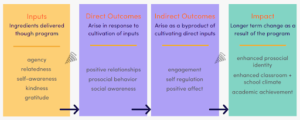
The program is innovative in its focus on student agency, uniquely combined with other inputs: relatedness, self-awareness, kindness, and gratitude. Inputs represent empirical psychological constructs that support the design and delivery of the curriculum. Direct Outcomes (the benefits and learning that participants experience after engaging with the program) include positive relationships, prosocial behavior, and social awareness, which in turn produce Indirect Outcomes of engagement, self-regulation, and positive affect. The Longer-term Impact (change at a larger scale as the result of the program) includes enhanced prosocial identity, enhanced classroom/school climate, and academic achievement.
ThinkGive’s proof of impact is evident in our high partner school retention rate, which averages 80%, and post-program quantitative and qualitative feedback gathered from student and educator surveys.
Students: We know that ThinkGive serves as a protective factor against anxiety by impacting relatedness, empowerment, self-care, and self-esteem. 2,500 students have reported:
-
- 84% felt more connected with family, 78% with community, 77% with friends, 65% with peers, and 61% with teachers
- 74% felt an increase in self-esteem
- 86% will be kinder to others
- 85% felt empowered to be a force of good
- 72% are better at seeing things from someone else’s point of view
Student Testimonials:
“ThinkGive made me recognize how I treat others, how they treat me, and how I treat myself.” – 8th grader
“ThinkGive challenged me to think of others first and what I can do for them. I learned that my actions are powerful.” – 6th grader
“Diverse friendships can make us more understanding and kind because if you have more experience with different types of people you will understand things from different perspectives.” – 5th grader
“ThinkGive has and will help me be a more considerate, thoughtful, and compassionate person. Knowing the positive effects I can have on a person is truly amazing.” – 7th grader
Teachers: We consider a program successful if teachers report on behavioral changes predicted in our Theory of Change including an increase in student empowerment, connection, kindness, and an overall shift toward a more caring and inclusive classroom community, and if 70%+ of students report an increase in feelings of connection, belonging, self-esteem, and empowerment, and in prosocial qualities such as empathy, kindness, gratitude, and social responsibility.
Teacher Testimonials:
“ThinkGive was revolutionary in helping me create a thoughtful, inclusive, and empathetic classroom. My students engaged with every single lesson, and put great thought and heart into each gift they gave. They became noticeably more mindful of their actions and conscious of their environment. They were so sad when we reached the wrap up, but so excited to carry the ThinkGive philosophies into their middle school journey.” – Dana Meyer, Carlisle Public School
“ThinkGive challenges students to be their best selves and understand that a better world is something they don’t need to wait for, they can create.” – Monica Chambray, Shady Hill School
“ThinkGive provides an authentic learning experience for children to fully understand the impact they have on one another. I don’t think one can find a more comprehensive program that promotes positive interactions in school. It’s simply a rewarding experience that everyone should have.” – Director of Specialists, Teaching and Learning, Beauvoir School
”Tomorrow we will be wrapping up what has truly been one of the best learning experiences of my life. The kids are definitely taking a lot from ThinkGive. Not only them, but us as well.” – Kliptown Youth Program (KYP)
Recommendations for Replication and/or Adaption
Implement at the classroom or grade level. ThinkGive suggests a bottom-up approach to SEL. Rather than aiming to drive change at the district or school-level through top-down changes advanced by senior leadership teams, we partner with individual teachers and prioritize ease of implementation and support at the classroom level. Program delivery provides you with flexibility and autonomy to incorporate the principles of SEL into your classroom at a pace suited to your unique circumstances.
Partner with ThinkGive. We value our partnerships with our educators! You can trust us! We will train you and answer all of your questions; we will support you if and when you need help; and we will follow up with outcomes so that you can see how ThinkGive is impacting your students and classroom.
ThinkGive offers a number of ways for educators to sample lessons before jumping into a longer program.
-
- Mini-lessons: These 15-minute lessons may be mini in size, but deliver a big impact. They provide you with an opportunity to discuss important topics like empathy, inclusion, compassion, and bravery with your class, and will empower your students to take action to effect positive change in their world.
- Sample lesson plans: Download a sample lesson plan (one offered per grade).
- Scope + Sequence: Download Scope + Sequences for our full programs and our Spotlights.
- ThinkGive Spotlight: Try a shorter themed program for free! You choose your theme and teach the five lessons at your own pace. These Spotlights use our same experiential learning cycle; between each lesson students take action and use the ThinkGive web portal to reflect and collaborate.
- To launch one of our flagship programs in your classroom/organization, fill out the form on our Get Started page. We’ll reach out to find a time to learn more about your goals and answer your questions. If you decide to implement the program, training is an easy 1-hour zoom session.
Contact Info
Penny Austen, Executive Director
info@thinkgiveproject.org
PO Box 92, Concord MA 01742
978-460-4345
Contact Us
